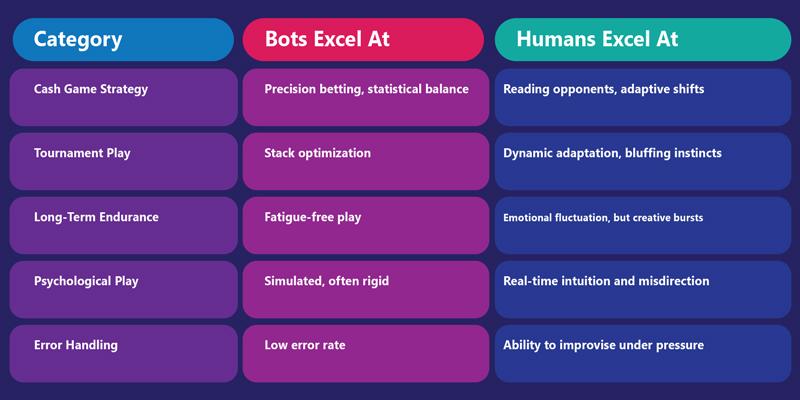What Is a Poker Robot? Human vs. Bot! Poker bot or poker robot is actually software that plays poker automatically with no direct intervention from humans.These robots are capable of playing internet poker games, reading cards, determining probabilities, and taking decisions in split second time. They are used in training programs all the way to tournament participation, but are revolutionizing internet poker forever.
A poker bot employs coded strategy. To emulate shrewd decision-making, it monitors player behavior, betting patterns, hand history, and game statistics.
Some employ simple logic, while others use sophisticated algorithms or even machine learning to emulate erratic human behavior.
Since game theory and machine learning continue to be developed by researchers, AI-driven poker bots are increasingly being used.
Artificial intelligence is increasingly being the propellant of online poker’s development, from simple programs to rather advanced bots that are professionals’ nemesis.
What Is a Poker Robot? Human vs. Bot
A poker robot, or “poker bot,” is a software program designed to automatically play online poker by making strategic decisions based on algorithms, statistics, and pattern recognition. Unlike human players, bots do not suffer from emotional bias, fatigue, or impulsive decisions, which allows them to maintain consistent performance throughout the game.
The key difference between a poker bot and a human player lies in the ability of bots to process large amounts of data quickly and play with mechanical precision. However, while bots may excel in analytics, they lack human intuition and adaptability in unpredictable scenarios. Understanding the contrast between human players and poker bots is crucial, especially in online environments where the presence of bots can affect fairness and the overall gaming experience.
How Do Poker Robots Work?
Poker robots work by using advanced algorithms and artificial intelligence to analyze game data and make strategic decisions in real time. These bots are programmed to evaluate variables such as hand strength, betting patterns, opponent behavior, and probability calculations. Many poker bots use databases of hands and machine learning to improve their gameplay over time, mimicking successful strategies used by human professionals.
They can also exploit predictable patterns in opponents’ play, often reacting faster and more consistently than a human could. Some sophisticated bots even use opponent modeling to adjust their strategy based on the specific tendencies of each player. Overall, poker bots operate with high efficiency and precision, giving them a potential edge in online games where emotional control and quick decision-making are crucial.
How Do Poker Robots Work?
Poker bots rely on a strategy engine or decision-making algorithm that uses game theory, opponent modeling, and Nash equilibrium. These bots analyze hand strength, pot odds, and opponent actions in real time to make rapid, risk-based decisions based on table position.
Core Algorithms and Strategy Engines
Some bots follow fixed strategies like folding weak hands or raising with strong ones. Others adapt dynamically to table behavior. Advanced bots use exploitative tactics to identify human patterns and capitalize on them a feature increasingly seen in white label poker solutions.
Machine Learning vs. Rule-Based Systems
There are two main types:
- Rule-Based Bots: Simple, predictable, and easy to detect.
- Machine Learning Bots: Learn from data, adjust strategies, and improve over time. Bots like Libratus and Pluribus have beaten pros using deep learning.
For anyone planning to buy poker software or build a poker platform, integrating intelligent bots can elevate the gameplay experience.
A Brief History of Poker AI Development

From Early Bots to Advanced Poker AIs
Early in the new millennium, rule-based systems marked the beginning of the evolution of poker bots. Despite their lack of flexibility, the bots could execute simple bluffs and tight-aggressive play, among other fundamental strategies.
The tech labs and the universities pushed the limits as the need to create smarter AI increased with online poker’s introduction.
As time went by, bots utilized advanced game-theoretic solvers in place of fixed decision trees. Bots were able to learn and defeat highly experienced humans due to Monte Carlo simulation and reinforcement learning.
Key Milestones: Pluribus, Libratus, and Deep
Created by researchers in Canada in 2017, DeepStack AI, made headlines when it outplayed professional poker players in heads-up no-limit Texas Hold’em. It combined ongoing re-evaluation while playing with deep learning.
Carnegie Mellon University created Libratus (2017), the first AI system to employ strategic thinking. It beat top-tier players in 120,000 poker hands without using any human data.
The first bot to beat several professionals in real-life play, in the six-player game was Pluribus (2019). It was able to execute strategic bluffs and adaptive moves outside programmed sets and was built in collaboration between Facebook AI and CMU.
They illustrate how sophisticated and intelligent poker bots today are becoming.
Is it acceptable to utilize poker robots?
Using poker robots is generally not acceptable and is considered cheating by most online poker platforms. These bots provide an unfair advantage by making mathematically optimal decisions, analyzing opponents without emotion, and playing tirelessly around the clock. As a result, they disrupt the fairness of the game and negatively affect the experience for human players.
Reputable poker sites strictly prohibit the use of bots and often have detection systems in place to identify and ban accounts that use them. While some may argue that poker bots are a technical achievement, their use violates the terms of service of nearly all legitimate platforms and can lead to permanent bans, confiscation of funds, and legal consequences.
Regulations for Sites and Local Legislation
Rules regarding playing poker with bots are determined by where you are and how you participate. Bot use is forbidden in the majority of regulated real-money markets, including the United States, United Kingdom, and the European Union. Furthermore, the terms and regulations of the majority of online poker sites clearly prohibit automatic participation.
When bot use is discovered, there may be financial seizures, permanent bans, and in some situations, legal action.
That said, some unregulated or private platforms may turn a blind eye or even experiment with bots themselves. However, using bots on these sites still poses serious ethical and competitive concerns.
Ethical versus Legal Use in Real-Money Play
The use of bots frequently crosses ethical boundaries, even in cases where they aren’t strictly illegal. At its core, poker is a human skill, psychology, and decision-making game. By playing near-perfect strategy without emotion or fatigue, a poker bot, especially one with sophisticated AI, creates an unfair advantage.
Bots can be useful tools for experimentation or training in the realm of play-money or simulation environments. However, their presence erodes competition, trust, and the essence of poker in real-money games.
Ethical Concerns of Using Poker Bots Online
Fair Play and Player Confidence
Fairness among human players is the central concept in internet poker. That trust is violated when poker robots are present. Robots have the ability to play all day long with decent skill and without feeling emotions, fatigue, or distractions.
This gives them a huge edge over human players, especially in lower-stakes games where detection is rare.
When players expect a level playing field after making a real money deposit, it can be disheartening to learn that they are facing bots. Repetitive exposure to unfair practices estranges users, harming not only specific platforms but also the reputation of the industry in general.
The Delicate Balance Between Help and Deceit
HUDs, or heads-up displays, and tracking software are paradigmatic examples of the new technology of poker that has created a great deal of controversy.
At what point does complete automation break down to allow room for sophisticated analysis? Most sites restrict automatic decision making on the tables but allow hand history review by software.
As AI keeps evolving, the moral line becomes more and more blurred. However, it is necessary to distinguish between machine-driven exploitation and the enhancement of human ability for the good of the community and the integrity of the sport.
Key Features of Modern Poker Robots
Decision making
In contrast to ancient hardcoded machines, new poker bots are not only very accurate but very fast as well. New bots calculate the best moves in less than one second by employing sophisticated algorithms and probabilistic approximations of real-time inputs.
Whether pre-flop aggression or river calls, poker robots are able to implement strategic moves that are far quicker than the pace of human operators.
Profiling enemies and adding heads-up displays
One of the more recent poker bots has the agenda-driven approach. These bots work painstakingly to create extensive player profiles, combining game histories with Heads-Up Displays (HUDs).
They’re highly attentive to trends like fold-to-3-bet rates and bluffs. and use that data to tune up their strategy.
There is something troubling, almost incomparable to humans, in the skilled profiling that these bots are capable of doing; but even with perfect memory and infallible logic, these are uniquely different from humans.
Bluffing and strategy adaptation simulations
Bots have the surprising ability to bluff tactfully. In order to induce uncertainty in the game, you will find them using game-theoretic algorithms such as Monte Carlo simulation and Nash Equilibrium.
Similar to experienced poker players, bots adapt strategies in the game, strategically developing along with the play trends that are evolving. Having their own best ground, they are always adaptable to evolve by you.
Real vs. Simulated Intelligence in Poker Bots
Here’s an easy table for your interest, to just sort things out:

How Are Poker Robots Detected by Online Casinos?
The online poker sites used detection software, which was also upgraded along with the bot software. Bots must be detected to maintain user confidence and integrity.
Operators use automatic detection tools, system monitoring, and behavior analysis to discover and report unusual activity.

Behavioral Pattern Analysis
In order to discover patterns outside the general trend of what humans play, casinos observe user behavior over time, including betting cadence, hand strength stability, and emotional stability.
Since bots are going to bet in a mechanical pattern, never getting timed out or betting on impulse, that data is input into artificial intelligence algorithms that search for robotic patterns.
CAPTCHA, IP Tracking, and AI Detection Tools
CAPTCHA tests are utilized by the majority of websites in verifying that there actually is a human playing the game. Where multiple accounts believed to be shared on one machine are present, IP tracking may be used in identifying common or suspicious connections.
Detection software on the basis of AI also tracks algorithmic playing patterns within the game which indicate non-human decision-making.
Such stratified methods, under constant monitoring and upkeep, enable poker sites to ensure game integrity and prevent bots.
Read More: The Right Mobile Poker Software Provider
Human vs. Bot
The debate over bots versus humans in poker is not definitive; while bots can defeat pros, their wins are inconsistent, and while bots are better at cash games due to their accuracy, humans win tournaments where bluffing and flexibility are required.
Robots benefit from fixed cash games because of their mathematical advantage, but dynamic tournaments force robots to be more adaptable. At higher levels, emotional intelligence surpasses logic. Humans are better at reading signals, improvising during gameplay, and spotting their opponents’ weaknesses.
Here’s another simple version of it:

Future Trends in Poker Automation
AI will develop sophisticated poker bots that emulate human play, learn strategies fast, and bluff well. Tables will have AI agents or better players available for training or research.
Could AI Replace All Online Opponents?
However, due to consumer demand for real competition and legal concerns about disclosure and equity, it is questionable that the majority of commercial poker websites will ever fully replace real players.
It’s that someday, AI will be capable of mimicking an entire table of different playing styles, making choices and screaming out like an entire table of different players. In order to make poker competitive, fair, and fun, online sites have to weigh creativity against ethics.
Responsible AI Development in Online Poker
AI may be more controlling in training, coaching, and sim-game but not as much in the game. Boundaries must be placed on yourself and the other players with increasing poker bot capabilities.
There is ethical development through transparency, user detection of bots, and ethical use of AI (e.g., through analytical software rather than real-time in-game assistance).
The Role of Poker Robots in the Game’s Future
We can observe that poker robots are transforming our perceptions of poker talent, competition, and equity in online poker.
As they become better, from mimicking human psychology to beating master players in challenging scenarios, their use in training, analysis, and even playing will grow.
The thrill of reading, bluffing, and reacting to unpredictable human behavior, however, is the thrill in poker.
A delicate balance has to be maintained to conserve this environment. While AI research has to be promoted, misuse has to be avoided by enforcing stringent rules and code of ethics.
Technology will be employed to enhance the game without undermining its integrity if observed keenly. Smarter code and smarter rule will eventually have to poker’s future.
FAQs about Poker Robot
- Are poker bots legal to use in online games? No, most online poker rooms prohibit the use of poker robots or bots for gaining an unfair edge, which eventually can result in bans or legal consequences. However, laws differ by location, and some hold good advancement toward technology.
- Can poker bots beat professional human players? Although sophisticated bots such as Pluribus and Libratus have proven to be superior to top professionals in certain formats, humans, on the other hand, are still to have an edge in multi-level bluffing, psychological play, and innovative tactics.
- How do online casinos identify poker bots? Online casinos identify poker bots through behavior analysis, pattern recognition, CAPTCHA, IP tracking, and anti-botting based on AI. They create a vision to see certain patterns, and to even work in improving it.
- How are AI-based poker bots different from rule-based bots? While AI-based bots involve machine learning for adjusting to opponents, imitation of bluffs, and getting stronger over a period of time, rule-based bots are only adhered to pre-defined plans. The difference is about difficulty to detect and how sophisticated you face them.

